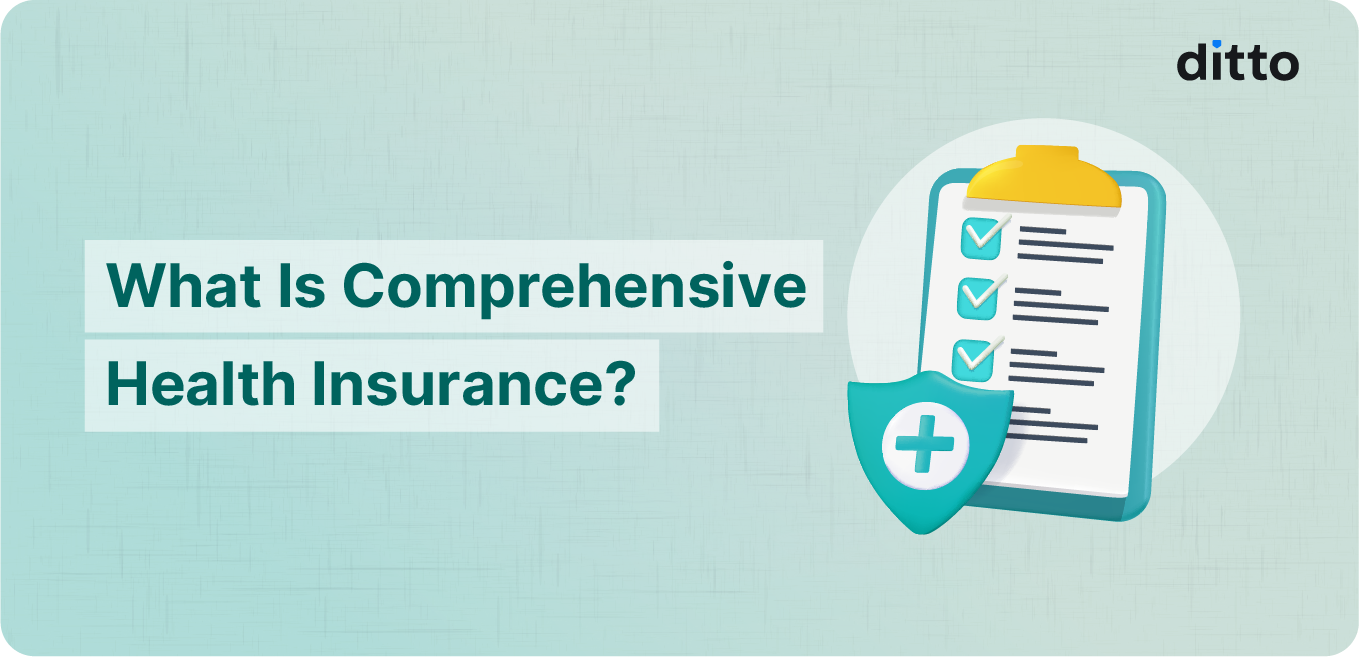Quick Overview
Imagine being hospitalized after an accident. You stay calm because you have insurance. But then, the bill arrives, and the insurer only covers part of it, citing a co-payment clause.
This is where a comprehensive health insurance plan can truly make a difference.
It offers protection in various situations, keeping your costs low when you need it most. The plan also shields your savings from unexpected bills, so that you have access to quality care without the added financial stress.
In this article, we’ll break down the key benefits of comprehensive health insurance, common pitfalls to watch out for, and highlight the best available plans.
List of Comprehensive Health Insurance Plans in India
Note: To know the methodology behind why these plans are recommended, refer to Ditto’s cut and framework.

Key Features of Comprehensive Health Insurance
Consumables Coverage
It covers items such as gloves, syringes, masks, bandages, and other disposable medical supplies used during treatment. Without this coverage, 8-10% of your bills could be attributed to consumables. Depending on the plan, this may either be included by default or available as a paid add-on.
Restoration Benefit
Your plan should automatically restore your sum insured once it’s exhausted, typically 100% once a year. Think of it as a backup that activates for future claims within the same year. In most comprehensive plans, this applies even for related claims an unlimited number of times, although it may vary by insurer.
Bonus
A good plan rewards you by increasing your coverage by 10-100% annually without hiking your premium the same way. It’s a simple way to keep up with medical inflation. This can be a No-Claim Bonus (given only in claim-free years), or a Cumulative bonus (given irrespective of claims) in case of more comprehensive plans.
Pre and Post Hospitalization
Your plan should cover tests, consultations, and medicines before admission and after discharge. Typically, that’s 60 days pre-hospitalization and 180 days post-hospitalization. It ensures that your entire treatment journey is covered- not just the hospital stay.
Day Care Procedures
Modern treatments no longer need an overnight stay due to better technology. Your plan should cover all day care procedures like cataract surgery, chemotherapy, or dialysis, so you’re protected even for short-duration treatments.
Modern Treatment Coverage
Coverage of advanced treatments like robotic surgeries or stem cell therapy under standard terms is especially crucial nowadays. These procedures are becoming common, and your insurance should keep up.
Annual Health Check-ups
It’s great to have a free health check-up every year, even if you haven’t made a claim. It’s a simple way to stay on top of your health and catch issues early.
Ambulance and Emergency Services
Good plans cover emergency ambulance charges, and higher-tier ones even include air ambulance support when time is critical. It ensures you get to the right care, fast.
Cashless Hospital Network
A good cashless network of hospitals in your area means higher chances that the insurer will directly settle the claim, without you having to pay first. This lets us focus on the treatment, and not the bill amount.
Things to Watch Out For When Purchasing Comprehensive Health Plans
- No Co-payment Clauses
It’s a fixed percentage or amount of a medical bill that you have to pay from your own pocket, while the insurer pays the rest. Not having a co-pay helps keep your out-of-pocket expenses low and focus on recovery. - No Room Rent Restrictions
A comprehensive plan should allow you to choose the room you need without any caps. Many associated costs, such as surgery or nursing charges, vary depending on the room category, which can affect your final payout. - No Disease-wise Sub-limits
Insurers may impose sub-limits on treatments like cataracts, knee replacements, or cancer, reducing your payout even with a high sum insured. A strong plan ensures no hidden caps or surprises when you file a claim.
Additional Features to Consider Based on Your Needs
- Domiciliary Care
If you can’t be moved to a hospital or there are no beds, your plan should still cover treatment at home. It can be crucial during severe illnesses, emergencies, or pandemics, where hospital care isn’t immediately possible. - Maternity and Newborn Cover
These benefits come with their own waiting periods, which varies from 9 months to 3 years. It might also cover newborns from Day one. We, at Ditto, recommend using your Corporate cover (if available), as it usually has a lot of limits and restrictions. - OPD Cover
A few plans also cover everyday medical costs - doctor visits, tests, and medicines - even when you aren’t hospitalized. This usually comes with sub-limits or as an add-on. Just like maternity, OPD also generally comes with a lot of limits and restrictions.
Benefits of a Comprehensive Health Insurance Plan
Covers High Medical Costs
Includes Critical Benefits
No Cost-Sharing Limits
Preventive and OPD Care
Premiums for Comprehensive Health Insurance Plans
Note: These are approximate premiums for individuals residing in Delhi, for a ₹15 lakh cover.
Why Choose Ditto for Health Insurance?
At Ditto, we’ve assisted over 8,00,000 customers with choosing the right insurance policy. Why customers like Rajan below love us:

- No-Spam & No Salesmen
- Rated 4.9/5 on Google Reviews by 15,000+ happy customers
- Backed by Zerodha
- Dedicated Claim Support Team
- 100% Free Consultation
Confused about the right insurance? Speak to Ditto’s certified advisors for free, unbiased guidance. Book your call now, slots fill up fast!
Conclusion
Having a comprehensive health insurance plan is essential. The more features it offers, the lower your out-of-pocket expenses are likely to be. However, premiums and the insurer's performance also play a crucial role, as ultimately, it’s the insurer who pays the claim, no matter how feature-rich the plan may be.
Frequently Asked Questions
Last updated on:










